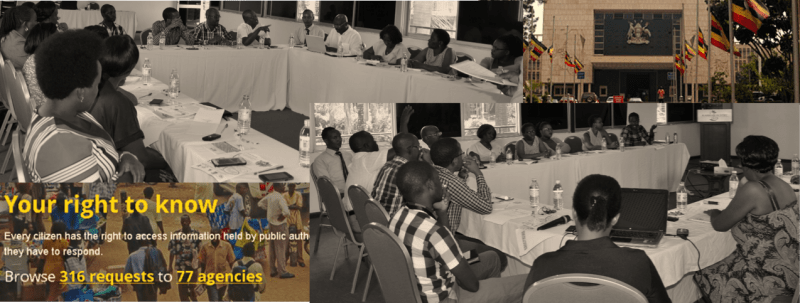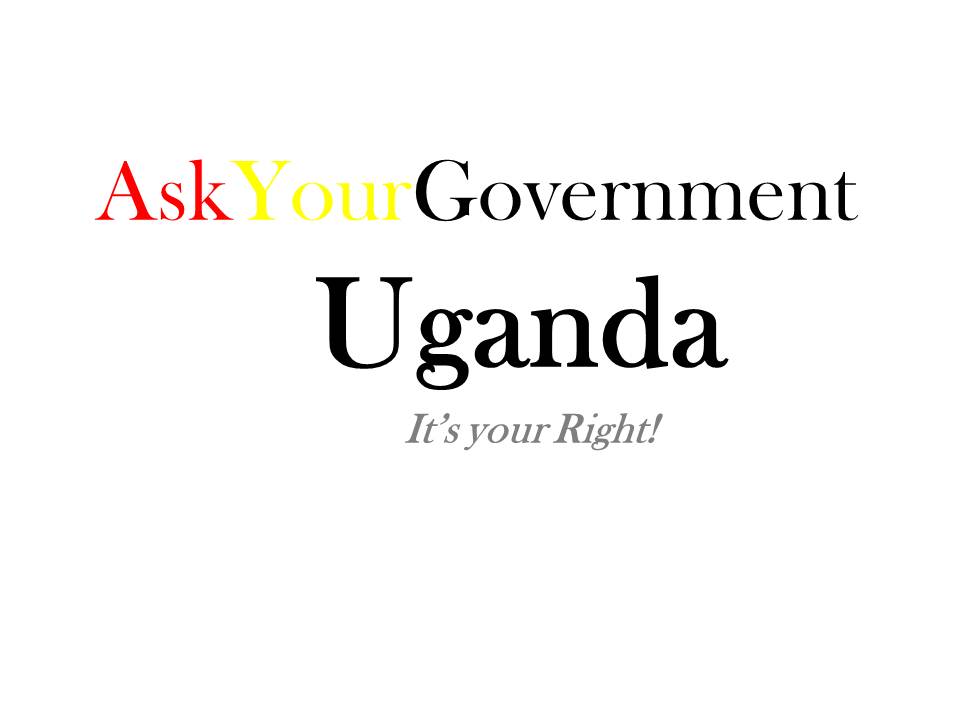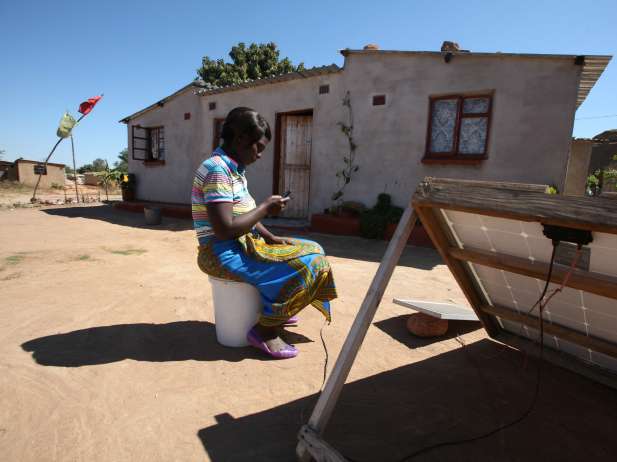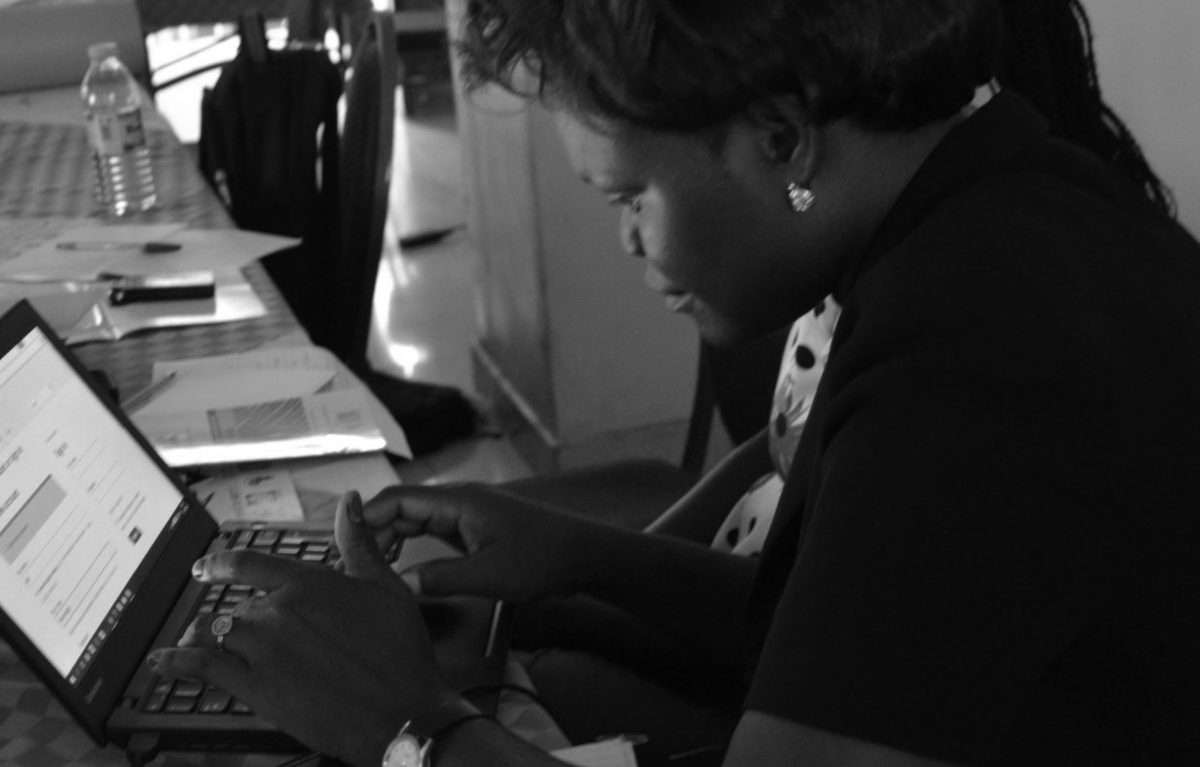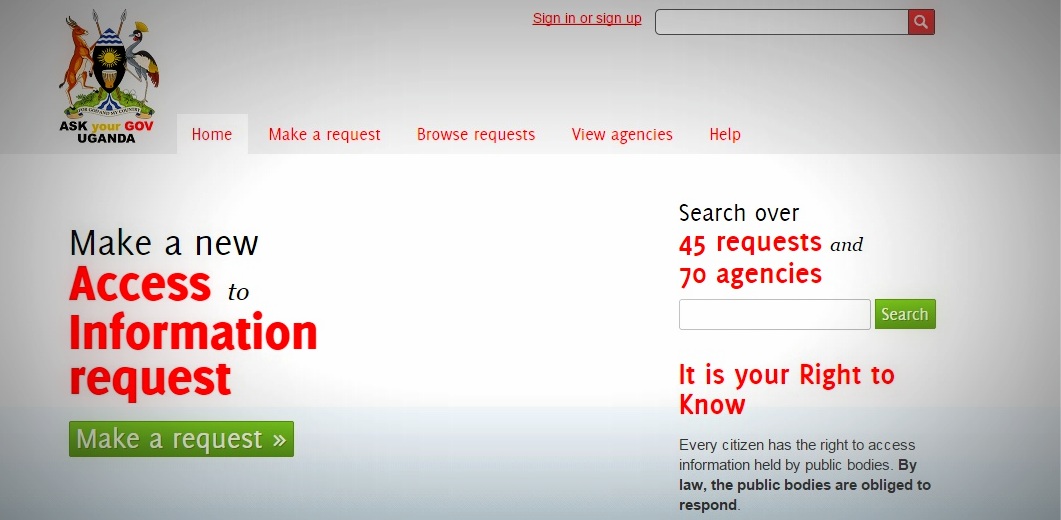By Loyce Kyogabirwe |
The right to information (RTI) is essential for the functioning of any democracy and is a prerequisite for transparency, accountability, gender equality and citizens’ participation in governance processes. However, Uganda faces numerous challenges to realising the right to access information despite having an access to information law. In the course of 2016, the Collaboration on International ICT Policy for East and Southern Africa (CIPESA) made various interventions to advance RTI, including holding training events and round table discussions for civil society, the media and government officials.
Uganda’s 2005 right to information law remains little known and largely unimplemented. Government Ministries, Departments and Agencies (MDAs) hardly release information voluntarily and tend to be unresponsive to information requests from citizens, due to a culture of secrecy and government bureaucracy that conflict with the law. Conversely, few citizens demand for information as a result of low awareness of their rights and the belief that public officials routinely ignore citizens’ information requests.
At a December 15, 2016 dialogue involving public officials, including information officers from various MDAs, journalists and civil society representatives, it emerged that the government and citizens have not prioritised RTI. “The role of information has been undervalued and sometimes it gets a zero release in [MDA] budgets,” said a public official. Another noted that 11 years after the law was enacted, no MDA has submitted an annual report to parliament on its information disclosure record, including requests received from citizens, as required by the law.
Other challenges prominently cited included under-staffing in MDAs, employing information officers that are unqualified and who often lack mandate to speak on behalf of the public entity, and conflicting laws that make implementing the RTI law difficult.
Journalists shared their experiences of regularly being denied information, often with no reason provided. One journalist noted that informal approaches are the primary means of attaining public information held by the state.
At an earlier training for journalists, which was held on November 23, challenges of public information officers who are either not authorised to release information, or who refer to secrecy oaths not to release information, were prominently cited.
Further, journalists pointed out the cost of accessing information as a hindrance for ordinary citizens. “If it is my right to access information then why am I paying for it?” asked Regina Nassanga of Mama FM. According to the law, a fee of UGX 20 000 (Just over US$ 5) is required when making a formal request at an MDA office.
Despite these obstacles, there are some indications that things could get better. Each government department is now required to have an information officer, and a few public bodies are beginning to implement the government’s 2013 Communications Strategy, although they have been unable to make any significant increase to budget allocations for the information function.
Civil society representatives pointed out additional concerns including the lack of deliberate action to promote RTI particularity for women and people with disabilities. Moreen Nambalirwa from the National Union of Women with Disabilities noted that when information is disseminated to the public via television and radios, people with visual and hearing impairments miss out. She also stated that despite the directive from the Uganda Communications Commission that all TV stations should have a sign language interpretation during some news broadcasts, none of the more than 10 local TV stations have done so, further contributing to the exclusion and limited participation by PWDs in governance processes.
The convenings were organised by CIPESA and provided a space for civil society, public officials and journalists to share their experiences, learn from one another, and suggest possible ways to improve access to information.
Project Evaluation: Open Data and Right to Information
Tweet
Report |
During 2014 and 2015, CIPESA implemented a project aimed at empowering citizens in East Africa to use Right to Information (RTI) laws to lodge requests and document their experiences through the use of Information and Communication Technologies (ICTs). The project further aimed to undertake awareness raising and network building activities to promote the right to information in Kenya, Uganda and Tanzania, and create awareness among lawmakers on regressive policies and practices that undermine proactive disclosures. The project also planned on network building to be achieved through the sharing of experiences gained from the three countries among the engaged network of change actors across the region.
Since the closure of project activities, an evaluation was commission to establish the achievements, outcomes and challenges registered by the project during the period January 2014 – December 2015. The evaluation assessed the appropriateness, effectiveness and outcomes of the project in relation to its planned objectives.
The evaluation focused on project activities in Uganda and the use of Alaveteli – an Open source platform that enables citizens to request for information with the replies recorded for all to see on the AskYourGov (AYG) website (www.askyourgov.ug) as the key technology medium, as well as social media namely Facebook and Twitter.
Key findings
The use of the AYG platform by citizens is still low, compared to alternative Freedom of Information (FOI) channels (for example, a respondent at the Ministry of Lands Housing and Urban Development reported that he receives/responds to approximately 32 requests a day by phone, face to face, or paper-based request forms), and has not grown over the two years. As well, the response from MDAs is below average. Though there is political will from the Office of the Prime Minister in Uganda, ownership of the platform and its continued functionality is still the responsibility of partners – Africa Freedom of Information Centre (AFIC) and CIPESA and does not seem to have yet taken root within most Ministries, Departments and Agencies (MDA).
Recommendations
- Consider a phased approach to implementing the AYG platform in MDAs. Adopting a more systematic phased approach to implementation and roll out, and contextualized to the specific needs of each agency could help address the unique MDA contexts and ensure a more effective use of the platform. Rather than spreading efforts (of particularly limited resources) and adopt a blanket approach to the implementation of the portal, a phased systematic approach that involves a few MDAs coming on board at a time is recommended. For example the evaluation shows that the majority of the FOI requests are related to land, taxes and inquiries on internship and recruitment. This could be interpreted in two ways: – (i) that these issues could be the most pressing information needs of citizens currently; or (ii) that the effective response from the respective MDAs has created citizen demand. This could give some insight to justify a phased approach in prioritizing MDAs to work with on the AYG platform.
- Build an Advocacy network of CSOs to sustain the demand for government responsiveness on the AYG platform. Such a network is likely to realize a much stronger and sustained voice in mobilizing, advocating and lobbying continuous Government’s responsiveness on the AYG platform.
- Sustain stakeholders’ engagement activities (awareness raising and capacity building). Some of the issues that hinder requesting and disseminating information by the rights holders (citizens) and duty bearers (government officials) respectively are the culture of secrecy among duty bearers, and the limited understanding of the RTI laws among other things. Changing such individual and organization norms, cultures and practices takes time. Sustained engagement of rights holders and duty bearers is therefore very critical and future projects should avail sufficient resources for this.
- Make the platform more inclusive to encourage usability in different contexts. Future implementations could adopt a more inclusive approach that looks into mixing ICT platforms such as the web-based platform, SMS, as well as integrate a back-end function that can easily be manipulated to enable agencies to coordinate and centrally manage information requests from the various modes of delivery i.e. the back-end function should be in position to manage, monitor and keep track of all requests that come into the agencies irrespective of the mode of delivery. This should encourage usability by all classes of stakeholders, while the back-end would provide for easy management and tracking of requests.
Lessons Learned
- The Success of the AYG platform in an MDA is dependent on a number of pre-requisites that include functional business processes, policies, infrastructure, and human resources related to information disclosure. This kind of organization context makes it easy for speeding up the uptake of the AYG platform as it complements already ongoing work and may not appear as an additional burden to MDA officials.
- The AYG platform could be more effective if its roll out is prioritized to target specific information needs of citizens. This prioritization could be based on a number of factors that may include: – findings of a needs assessment of Citizen Information needs, readiness of MDAs, National priorities defined in strategies like National Development Plans among others
- The passing of relevant RTI laws in the country is key in providing an enabling environment to implement a project of this nature
Download and read the full evaluation report here.
Africans Want Cross-Border Data Access Reform, But They Might Get Left Out
Tweet
By Mailyn Fidler |
At the first session of the 2016 Forum on Internet Freedom in Africa, questions about cross-border data access—usually a dry topic—took center stage. The moderator and participants grilled representatives from Google and Facebook about the fairness of limited African access to African data held by U.S. companies, invoking the need for greater “internet sovereignty.” These remarks contrasted with one year ago, when I could find no one at this forum talking about African data access problems. Africans are now thinking about this issue, but the U.S. government is not really considering Africa as it debates the future of cross-border data requests. The standards outlined in the Obama administration’s draft proposal will be most easily met by favored U.S. partners; the United Kingdom appears to be first in line for a deal. Left-out countries will have few viable options for accessing data and may turn to damaging alternatives.
Background: A Year of MLAT Reform
The past year brought cross-border data access into the limelight. Countries have grown frustrated with the primary mechanism for accessing data held by U.S. tech companies: Mutual Legal Assistance Treaties (MLATs). As communications increasingly depend on U.S. tech companies, data needed for run-of-the-mill criminal investigations often resides in the United States, and countries turn to MLATs for access. MLATs with the United States generally require countries to meet U.S. legal standards when seeking data stored in the United States.
The MLAT process is usually slow and opaque, frustrating countries using it. It can take six weeks to ten months to process requests, depending on the request’s complexity and compliance with U.S. legal standards. Countries also take issue with U.S. law essentially dictating global practices. Countries have sought other troubling means of accessing data, with the UK seeking extraterritorial powers, Russia exploring data localization, and Brazil threatening companies with legal action.
Over the past year, efforts to reform cross-border data access have progressed. The United States and the United Kingdom have negotiated a proposed agreement, and the Department of Justice released draft legislation to make such agreements possible for approved countries. (The legislation is unlikely up for consideration until after the U.S. election.)
Africans Want Improved Data Access
Although Africa currently has low levels of internet penetration, it also has some of the highest internet use growth rates. Internet policy issues are increasingly important to Africans, and African internet policy wonks are joining the call for cross-border data access reform. Tefo Mohapi, the moderator of the opening panel, asked company representatives about building mirror datasets in African countries to allow African countries greater access to data held by U.S. companies, a form of data localization. “It all goes back to internet sovereignty,” Mohapi argued. “You operate with legal impunity without regard for state sovereignty.”
Participants continued to criticize the United States, adding that, “America has ceased to be the shining jewel of internet freedom” post-Snowden. African countries are often portrayed as untrustworthy and undeserving of data, even by the company representatives at this conference. Post-Snowden, African countries “want the discourse to expand beyond bad African governments, with the kind United States coming to save us.” African governments should have the same access as the now-untrustworthy United States, participants argued.
The company representatives responded to these criticisms by highlighting ongoing cross-border data access reform efforts. They emphasized that existing cross-border data access procedures are burdensome, and that they are in conversation with governments to change the process. They eagerly pointed out that ultimate responsibility for fixing this problem rests with governments, not companies.
Only two African countries, South Africa and Egypt, currently have MLATs with the United States. The proposed U.S. legislation could allow countries without MLATs to gain legal access to data (see Section 4), in theory addressing African concerns. In practice, however, it could be difficult for some African countries to meet the legislation’s legal standards. The United States must determine that a country has an independent judiciary, adequate substantial and procedural cyber laws, and adequate international human rights practices. The lack of adequate cyber laws alone would be enough to thwart most African data access agreements with the United States. More generally, the United States will likely not consider countries without MLATs a priority for new data access agreements. African countries’ general lack of political pull could considerably slow or reduce new African data access agreements.
Left Out of MLAT Reform: Potential Consequences
Cross-border data access reform is generally portrayed as the solution to the data localization laws, prosecutions of tech companies, and extraterritorial application of laws that countries have pursued when frustrated with MLATs. Most countries who have been turning to these methods, however, at least have MLATs, while African countries do not. African countries will likely be last in line for new data access agreements. Being shut out of both data access options means African countries will be twice marginalized.
African countries lacking an MLAT and a data access agreement with the United States will have few options for pursuing data. Countries can submit emergency requests to companies or ask for a joint investigation with the United States. African countries are already sensitive to concerns that they lack autonomy, and autonomy-constrained states are often most motivated to protect their autonomy. African countries might respond to their double marginalization by enacting data mirroring requirements, as the moderator at the forum suggested. Another forum participant suggested that African governments might increase internet shutdowns if they lack post-hoc data access, as a way of preemptive control. Ironically, U.S. efforts to allow countries greater access to data in the United States may result in African citizens having less access to the internet.
Cross-border data access should not be extended without qualification. Still, current reform plans seem likely to place African countries in a difficult position on a policy area that is increasingly important to them. If the United States really seeks to limit the proliferation of damaging data-access workarounds, it should think about what will happen to those who are left out of cross-border data access reform.
Mailyn Fidler is a fellow at the Berkman Klein Center for Internet and Society at Harvard University. You can follow her @mailynfidler. This article was first published at Council on Foreign Relations on October 26, 2016.
Uganda District Officials Trained on Access to Information Tool
By Moses Odokonyero |
Local government officials from the northern Uganda districts of Gulu, Amuru and Nwoya were recently trained in the use of the online freedom of information portal Ask Your Government (AYG). The officials have said the platform, which is accessed at www.askyourgov.ug, will be useful in improving the flow and exchange of information between their districts and the public. The training organised by the Collaboration on International ICT Policy for East and Southern Africa (CIPESA) in partnership with Northern Uganda Media Club (NUMEC) and was held August 31 in Gulu, Uganda. Participants at the training included Information Officers, Community Development Officers, Natural Resources Officers and an Assistant Chief Administrative Officer from the administrations of the three districts in the Acholi sub region.
The training aimed to promote the release of public information held by the state through the use of online tools but with a specific focus on the AYG portal. The portal was launched in 2014 by the Uganda Office of the Prime Minister in partnership with the Africa Freedom Information Centre (AFIC) and CIPESA and is aimed at supporting the Access to Information Act (2005) by enabling citizens to request and receive public information from government authorities.
“I was unaware of the website before the training. But I now know how to use it. I think it will be useful in the sharing of information between us in the local governments and the public,” said Anthony Onen, the Amuru District Population Officer. He added, “But we need more of our colleagues in other departments also trained on how to use the website … because these departments hold information that is important for the public.’’
Meanwhile, Santa Odwa, an Assistant Chief Administrative Officer (CAO) with the Gulu district local government, remarked: “The training on how to use this website will help improve sharing of information with the public but the public must also be sensitised on how to use it and what kind of information can be asked for and not asked for from us.”
The district officials were also taken through different laws in Uganda that govern citizens right to access information, particularly the Access to Information Act, 2005. The Act aims, among others, to promote transparency and accountability in organs of the state by providing the public with information, and to empower the public to scrutinise and participate in government decisions that affect them.
In the context of northern Uganda, transparency and accountability by public authorities and the involvement of the public in the scrutiny of the public organs is particularly important. In the last decade, the region has seen several post-conflict recovery projects funded by both the government of Uganda and donors aimed at rehabilitating the region following years of conflict. Most of these projects have been implemented under the framework of the Peace, Recovery, and Development Programme (PRDP).
Due to a lack of public scrutiny and limited information available to the public about projects under the PRDP, substandard work and corruption impeded delivery of public services under PRDP. In 2012, the Auditor General uncovered the swindling of over 50 billion shillings (US$14.7 million) by officials, which may have been exacerbated by a lack of transparency in the operations of the programme.
In September, 2016, the government launched a UGX 233 billion (US$68.5 million) —Project Restoration of Livelihoods in Northern Uganda (PRELNOR). The seven-year project aims to improve livelihoods and construct community roads to link local communities in nine districts in the Acholi region to markets. This type of project underscores the continued need for the public to have access to information to empower them so they are in position to hold public organs and officials accountable.
According to the communications regulator, as of March 2016, there were approximately 21 million mobile phone subscriptions while 38.9% of Ugandans had access to the internet. These figures pose a great opportunity for citizens to find innovative ways to shape democratic governance, including to monitor government transparency. The AYG portal and other online platforms are increasingly gaining influence and becoming important channels to disseminate information, promote accountability and cause public debate around public service delivery issues in Uganda.
The training is part of activities by CIPESA, NUMEC and local partner radio stations to promote the right to information as a catalyst for service delivery monitoring in northern Uganda and in supported by the Indigo Trust.
Uganda Marks Decade of Access to Information Law
By Esther Nakkazi |
On September 28, 2015, the International Right to Know Day was commemorated in Uganda at an event that also marked the 10th Anniversary of the enactment of the country’s Access to Information Act (ATIA).
During the celebrations held alongside the 2015 Forum on Internet Freedom in East Africa, stakeholders discussed experiences, lessons and challenges relating to ATIA, which was passed in 2005. The event also served as the launch of the 2015 report on the State of the Right to Information in Africa.
The celebrations were hosted by the Africa Freedom of Information Centre (AFIC) and the Collaboration on International ICT Policy for East and Southern Africa (CIPESA) together with the Ministry of Information and National Guidance (MING) in the- Office of the Prime Minister (OPM).
Uganda was the first country in East Africa to adopt an access to information law. It was followed by Rwanda in 2013, making the two land-locked nations the only ones among the five member states of the East African Community (EAC) with access to information laws.
Implementation of the ATIA in Uganda has been slow, partly because regulations to give effect to the law were passed in 2011, six years after the Act was enacted.
Proactive release of information remains low to-date, while the culture of secrecy and fear of reprisal remains prevalent. According to Gilbert Sendugwa, the Executive Director of AFIC, “many Ugandans still do not understand what it means to have the Access to Information Act”. Sendugwa added that building awareness and demand for information among citizens as well as creating responsiveness from public agencies, were required in order to improve implementation of the ATIA.
Silvia Birahwa from the Directorate of Information and National Guidance noted that as a result of the delay in passing ATIA’s regulations, there were different levels of compliance by government ministries, departments and agencies (MDAs). Some government officials were compliant while others made little or no responses to requests for information, she said.
Birahwa said Information officers of various MDAs reported a lack of capacity, including limited access to the internet and a lack of interest amongst staff, as barriers to the release of information. Accordingly, the government communication strategy is aimed to better equip Chief Information Officers within the MDAs to better respond to information requests and to aid the progress of the ATIA.
The Ministry of Lands, Housing and Urban Development (MLHUD) received an award for their consistent and prompt release of information using the Ask Your Government (www.askyourgov.ug) website. Dennis Obbo, the Principal Information Scientist at MLHUD, received the award on behalf of the ministry.
In order to encourage more citizens to exercise their right to information, in August last year, the OPM through the Ministry of Information and in partnership with AFIC and CIPESA launched www.askyourgov.ug to enable citizens to directly request public agencies information.

